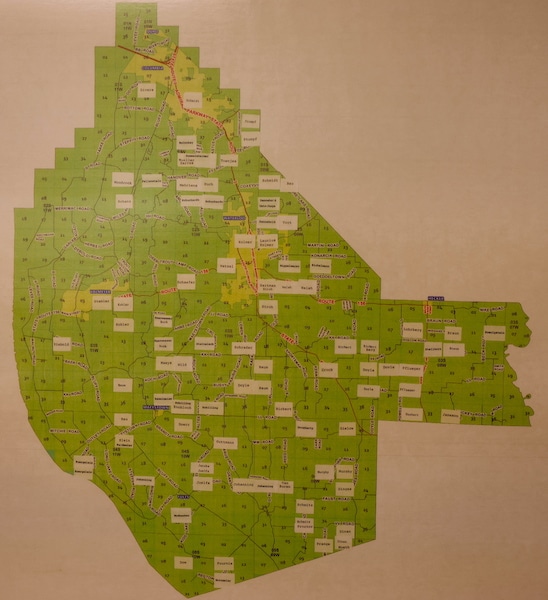Book captures farming legacy

A local history buff recently completed a substantial effort toward recognizing and honoring the history of family farms in Monroe County, recording those which have stayed with families for over a century.
The Illinois Centennial Farms program, per the Illinois Department of Agriculture, is meant to honor farm families that have continued their work for several generations.
Those farmers who work agricultural property that has been owned by the same family for at least 100 years qualify for centennial farm status, and, with an application and fee of $50, can receive a road sign and certificate from the governor and director of agriculture officially recognizing the farm’s centennial status, along with an invitation to Agriculture Day at the Illinois State Fair.
Local farms with this status were recently recognized in the book “Centennial Farms of Monroe County, Illinois” by Mary Ellen Huetsch of the Monroe County Genealogical Society.
Huetsch previously served as part of the state board of the Illinois Genealogical Society. In that position, Huetsch said she and her colleagues had access to the Centennial Farm applications that were sent in.
“I really enjoyed looking at the Monroe County ones, and I thought ‘Someone should put this together in a book,’” Huetsch said. “The Illinois Department of Agriculture did a book statewide, but in one of the books, there’s only two Monroe County farms, and in the other book there are five Monroe County farms.”
Per Huetsch, 80 farms in Monroe County have achieved this certification, though she said that is hardly all the farms that qualify.
“I am positive there are many, many more in our county, but, y’know, the farmers didn’t apply for that status,” Huetsch said.
She also noted the possibility that some farms in Monroe County could have been kept in the family for significantly longer than a century.
With her interest in this area of history, Huetsch set aside the possibility of putting together a collection of these farms until the COVID-19 pandemic gave her the opportunity to get started on the project.
Huetsch was unfortunately unable to access the records in Springfield she had previously seen, as apparent privacy concerns over recent years have resulted in those documents only being accessible by folks with the Department of Agriculture.
Still determined to compile this history, Huetsch reached out to those families in the county with Centennial Farm status and asked them to submit their farm’s stories.
Of those she reached out to, 40 families got back to her, sharing pictures and information about how their farms began, how they developed and what life has been like in their families.
“Centennial Farms of Monroe County, Illinois,” serves as a compilation of these stories, allowing the reader a glimpse into the history of family farming in this county.
These stories were compiled by Huetsch and Megan Gorka, though Huetsch noted she also wrote two of the items in the book as the families had died out.
“The book is really authored by all the people who own the farms and sent in their stories,” Huetsch said. “I just compiled it.”
The 40 stories in the book contain a variety of anecdotes and other items of Monroe County agricultural history.
Huetsch recalled one particularly striking story of a family coming to this area from Europe, bringing their son along in a large, custom-made trunk in order to avoid sending him off to war.
Most stories in the book simply describe the start of the family farm and how it’s developed over the years, such as the Baum family farm purchased 1873. This entry, written by Craig Baum, opens with the following paragraph:
“Around 1800, Andrew Kinney built a water-powered grist mill on the north bank of Ryan’s Creek in present-day Monroe City in Monroe County, Illinois. He and his family lived in the old trapper’s cabin across the creek from the mill. Kinney scratched out a living farming and serving the community by milling wheat for other farms in the surrounding area. The business was apparently successful and before the War of 1812, Kinney was shipping flour to New Orleans for export to Europe. Ever the entrepreneur, Kinney even installed a cotton gin in 1814, enticing cotton farmer clients from Southern Illinois and Southeast Missouri.”
Don Schrader’s recounting of the Schrader farm history opens with how Johann Christoph “Christ” Meyer began the farm in 1864, though a great deal of the entry centers around the fifth generation of the farm as Schrader describes his personal experiences growing up on the property.
The first few pages of the book also provide a simple list of Centennial Farms in the county along with the date they were founded, noting how several of them are actually sesquicentennial farms – meaning they have a history stretching back at least 150 years.
Huetsch said her interest in compiling this book came largely from her time growing up on a farm paired with a general interest in history which began in high school.
She expressed her hopes that the book will help encourage those other families in the county eligible for Centennial Farm status to apply – though she also simply wanted to help share these farms’ histories.
“I think, in the future, farms are going to be so important for food as the population grows, and we learn so much from history,” Huetsch said. “I didn’t make any money on this book, and I didn’t intend to. I did it to preserve the history.”
Huetsch will be presenting her book at Morrison-Talbott Library in Waterloo on June 20 at 6:30 p.m. following the genealogical society’s meeting. The public is invited to attend.






